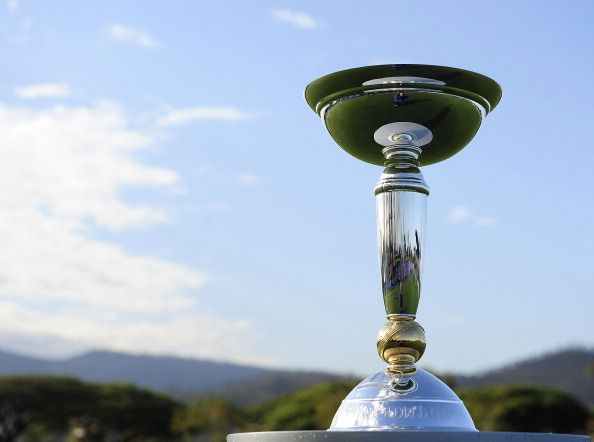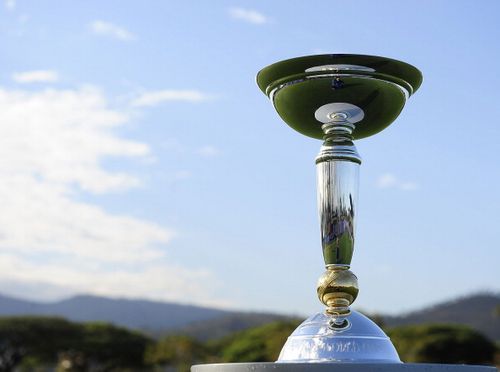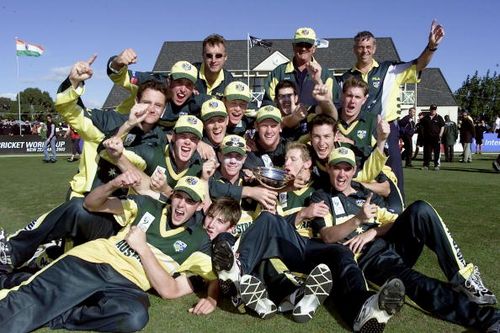
ICC U19 World Cup - Winners and performers of 9 editions so far

ICC U19 World Cup trophy
The ICC U19 Cricket World Cup UAE 2014 will be the tenth edition of the event that was first staged in Australia in 1988 as part of Australia’s Bicentenary celebrations.
It became a biennial event in 1997-98 and since then, is seen as an important opportunity for the up-and-coming players to perform on the world stage and increase their awareness and understanding of the sport’s codes, including anti-doping and anti-corruption.
There are many other positive learning opportunities for players at the event, including promotional and social responsibilities and dealing with the international news media through interviews and press conferences. The ICC assists them with education and support in these areas.
In addition to this, Fox STAR Sports, the ICC’s broadcast partner till 2015, televises live matches from one of the venues. Live action from 10 matches at the Tony Ireland Stadium in Townsville, Australia, had been relayed to more than 180 countries from the 2012 edition. From the edition before that, 10 matches at the Bert Sutcliffe Oval in Lincoln, New Zealand, were relayed in more than 100 countries in 2010.
We take a trip down the memory lane to relive some of the finest memories of the previous events, which have produced well-deserved champions and seen some of the most outstanding individual performances by players including those who have gone on to lead their national sides at the highest level.
1988 – Australia | Winner – Australia
The inaugural event was staged in Victoria and South Australia from 28 February to 13 March and featured the then seven Full Members – Australia, England, India, New Zealand, Pakistan, Sri Lanka and West Indies – and an ICC Associates XI.
In a single league format, Australia and Pakistan finished on top of the points table and faced off in the final where Australia defeated Pakistan by five wickets at the Adelaide Oval. Batting first, Pakistan scored 201 in 49.3 overs with Inzamam-ul-Haq finishing as the top scorer with 37. Shahid Nawaz and Zahoor Elahi scored 35 each, while Basit Ali scored 23. For Australia, Wayne Holdsworth and captain Geoff Parker equally shared six wickets between them.
In turn, opener Brett Williams scored a fine 108 to guide his side to victory with 25 balls to spare. Stuart Law chipped in with 44 and featured in a 97-run second wicket stand with Williams.
Stalwarts like Mike Atherton, Nasser Hussain, (both England), Lee Germon, Chris Cairns (both New Zealand), Inzamam-ul-Haq (Pakistan), Brian Lara, Jimmy Adams, Ridley Jacobs (all West Indies) and Sanath Jayasuriya (Sri Lanka), who appeared in this event, went on to captain their national sides.
Mark Ramprakash, who in 2008 became the 23rd and last to score hundred first-class centuries, also represented England in this tournament while Aminul Islam, who represented ICC Associates XI in the event, went on to become Bangladesh’s first century-maker in a Test when he scored 145 against India in Dhaka in his country’s inaugural Test in November 2000.
India’s Narendra Hirwani had come into this event after taking 16-136 against the West Indies in the Chennai Test. This still remains as best bowling performance in a match by an India bowler.
Other players who played at the highest level for a longer period of time include Mushtaq Ahmed, Basit Ali, Aqib Javed (all Pakistan), Romesh Kaluwitharana, Sanjeeva Ranatunga, Chandika Hathurusingha (all Sri Lanka), Allan Mullally (who represented Australia but played international cricket for England), Nayan Mongia (India), Stuart Law (Australia), Tim de Leede (the Netherlands) and Mark Hastings, Chris Cairns and Shane Thomson (all New Zealand).
1998 – South Africa | Winner – England
The event was held in South Africa from 11 January to 1 February with 16 teams participating in it, including the then nine Full Members and seven qualifiers – Bangladesh, Denmark, Ireland, Kenya, Namibia, Papua New Guinea and Scotland.
In the Super League final at the Wanderers, England defeated New Zealand by seven wickets – thanks to opener Stephen Peters’ 107. Owais Shah scored 54 not out and Graeme Swann chipped in with an unbeaten 22 in a fourth wicket unbroken stand of 31 runs as England achieved the 242 runs target in 46 overs.
Earlier, New Zealand’s 241 had revolved around James Franklin’s 56 not out, Peter McGlashan’s 53, James Marshall’s 26, Lou Vincent’s 19 and Hamish Marshall’s 14. Giles Haywood was England’s most successful bowler with three for 18.
In the Plate Championship final, Bangladesh defeated the West Indies by six wickets despite Chris Gayle’s whirlwind 141. However, Al Sahariar (90 not out), Mehrab Hossain (63) put on 103 runs for the third wicket to ensure their side achieved the 245-run mark with 19 balls to spare.
The tournament featured future Test captains in Virender Sehwag (India), Shoaib Malik, Abdul Razzaq (both Pakistan), Graeme Swann (England), Thilina Kandamby (Sri Lanka) and Gayle, Ramnaresh Sarwan, Darren Ganga and Sylvester Joseph (all West Indies). Tim Anderson, ICC’s Global Development Manager, skippered Australia in this event.
Sehwag also won the ICC Test Player of the Year Award at the LG ICC Awards in Bengaluru in 2010.
Other notable cricketers to emerge from this event included James Hopes, Marcus North (Australia), Hannan Sarker, Manjurul Islam, Mehram Hossain (all Bangladesh), Owais Shah, Robert Key (England), Mohammad Kaif, Harbhajan Singh (all India), Kyle Mills (New Zealand), Hasan Raza (youngest-ever Test cricketer), Imran Tahir (who played for Pakistan but now represents South Africa), Robin Petersen, Jacques Rudolph (both South Africa), Dilhara Fernando, Chamara Silva, Prasanna Jayawardena (all Sri Lanka) and Runako Morton, Marlon Samuels, Ryan Hinds (all West Indies) and Mark Vermeulen (Zimbabwe).
2000 – Sri Lanka | Winner – India
Sri Lanka played host to the third edition of the tournament from 11-28 January. The event featured the then nine Full Members and seven qualifiers – Americas Region, Bangladesh, Ireland, Namibia, Nepal and the Netherlands.
In the Super League final at the Sinhalese Sports Club, India defeated Sri Lanka by six wickets to win the first of its three ICC U19 CWC titles. Sri Lanka, batting first, managed only 178 in 48.1 overs with Jehan Mubarak scoring 58 while Shalabh Srivastava finished as the pick of India bowlers with three for 33. India achieved victory for the loss of four wickets in 40.4 overs with man of the match Reetinder Sodhi scoring 39 not out, Niraj Patel 34 not out, Yuvraj Singh and Manish Sharma 27 each and Mohammad Kaif 18.
In the Plate final at the Asgiriya Stadium in Kandy, South Africa defeated Bangladesh by 80 runs. Batting first, South Africa scored 213 in 49.4 overs with Graeme Smith top scoring with 51 and Jonathan Trott, who now represents England, contributing 41. In turn, Bangladesh was dismissed for 133 in 47.5 overs with Dewald Senekal taking three for 20 and Albie Morkel bagging two for 36.
Graeme Smith, who is the current South Africa Test captain, finished as the leading run-getter with 348 runs while Pakistan’s Zahid Saeed was the most successful bowler with 15 wickets at an average of seven runs per wicket. India’s Yuvraj Singh, however, won the player of the tournament award.
Yuvraj, in 2008 in Dubai, also won the ICC T20I Performance of the Year at the LG ICC Awards for his six sixes against Stuart Broad in an ICC World Twenty20 2007 match in Durban.
Apart from Smith, Michael Clarke, Shane Watson (both Australia), Rajin Saleh (Bangladesh), Tatenda Taibu, Hamilton Masakadza (both Zimbabwe), Johan Botha (South Africa) and Brendan McCullum (current New Zealand skipper) progressed to captain their national sides.
While Trott won the ICC Cricketer of the Year Award at the LG ICC Awards in London in 2011 and McCullum won the ICC T20I Performance of the Year Award at the LG ICC Awards in Bengaluru in 2010, Ian Bell, who represented England in this tournament, won the ICC Emerging Cricketer of the Year award at the LG ICC Awards in Mumbai in 2006.
Other players to make a name for themselves in international cricket include Nathan Hauritz, Ed Cowan, Mitchell Johnson, Shaun Marsh (all Australia), Ian Butler, Jamie How, Nathan McCullum (all New Zealand), Albie Morkel (South Africa), Jonathan Trott (who played for South Africa but now represents England), Imran Nazir, Imran Farhat, Taufeeq Umar, Faisal Iqbal, Yasir Arafat, Mohammad Sami, Danish Kaneria (all Pakistan), Jehan Mubarak (Sri Lanka), Sewnarine Chattergoon, Narsingh Deonarine (all West Indies) and Sean Ervine, Greg Lamb (both Zimbabwe).
2002 – New Zealand | Winner – Australia

World Cup cricket U19 – Australia celebrate after winning the final
New Zealand hosted the tournament for the first time from 19 January to 9 February. The event featured the 10 Full Members along with six qualifiers – Canada, Kenya, Namibia, Nepal, Papua New Guinea and Scotland.
In the Super League final, Australia won its second title when it defeated South Africa by seven wickets. Batting first, South Africa scored 206-9 in 50 overs with Greg Smith scoring 51, Hashim Amla 29 and Zwelibanzi Homani 52. For Australia, Aaron Bird took four for 47. In its chase, Australia achieved victory in 45.1 overs with opener Jarrad Burke hitting 100 off 130 balls and was well supported by Craig Simmons (24), Shaun Marsh (35) and captain Cameron White (22).
In the Plate Championship final, Zimbabwe defeated Nepal by 137 runs after Zimbabwe opener Brendan Taylor scored 100 not out, Charles Coventry smashed 64 and Tatenda Taibu returned unbeaten on 65. In turn, Nepal, chasing 248 for victory, was dismissed for 110 with Hamilton Masakadza bagging three for 16.
Tatenda Taibu walked away with the player of the tournament award, Cameron White finished as the leading run-getter with 423 runs and left-arm spinner Xavier Doherty ended up as the most successful bowler with 16 wickets at just under 10 runs per wicket.
While Coventry at one time shared the world record along with Pakistan’s Saeed Anwar for the highest individual in an ODI (194), Taylor is the current Zimbabwe captain.
Also, Hashim Amla has led South Africa, White has led Australia in Twenty20 Internationals, Mohammad Ashraful has captained Bangladesh in the last decade, Dwayne Bravo and Darren Sammy have skippered the West Indies, and Brendon Taylor and Elton Chigumbura have led Zimbabwe.
India’s Irfan Pathan, who won the ICC Emerging Cricketer of the Year Award at the LG ICC Awards in 2004 in London and later picked up a hat-trick off the first three balls of the Karachi Test against Pakistan in 2005-06, also played in this tournament.
India captain at the event, Parthiv Patel, became the youngest wicket-keeper to represent India in Tests later in the same year.
Other notable players from this event include Daniel Christian, Xavier Doherty (both Australia), Nafees Iqbal (Bangladesh), Tim Bresnan, Samit Patel (both England), Jesse Ryder (New Zealand), Azhar Ali, Umar Gul (both Pakistan), Upul Tharanga, Dammika Prasad (both Sri Lanka), Shane Shillingford and Lendl Simmons (both the West Indies) and Sean Ervine (Zimbabwe).
Gul also won the ICC Twenty20 International Performance of the Year award at the LG ICC Awards 2013 for his spell of 5-6 from 2.2 overs versus South Africa in March 2013.